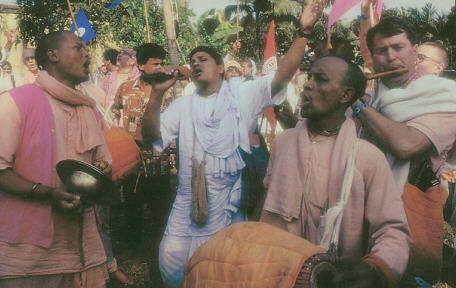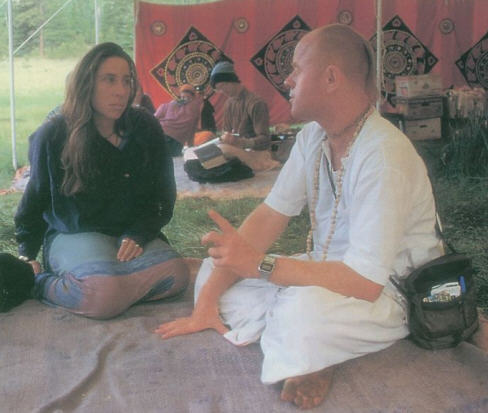Lord Krsna descended as Sri Caitanya Mahaprabhu to teach this essential spiritual practice.
In Srimad-Bhagavatam (7.5.23-24), the devotee Prahlada Maharaja, a great spiritual authority, says, "Hearing and chanting about the transcendental holy name, form, qualities, paraphernalia, and pastimes of Lord Visnu [Krsna], remembering them, serving the lotus feet of the Lord, offering the Lord respectful worship, offering prayers to the Lord, becoming His servant, considering the Lord one's best friend, and surrendering everything unto Him (in other words, serving Him with the body, mind, and words) these nine processes are accepted as pure devotional service. One who has dedicated his life to the service of Krsna through these nine methods should be understood to be the most learned person, for he has acquired complete knowledge."Here we continue our series on the nine processes of bhakti-yoga, or devotional service to the Lord.
A Single Word Can slice our heart to shreds. It can inspire a flood of joy or raging anger. Words form the lyrics of love songs and the dialog of hate. They link us in love and act as barriers to understanding. Think of the most emotion-filled moments of your life, and quite likely you'll hear the echo of words once spoken.
The gift of speech is so fully integrated into life that we scarcely consider its importance. And yet, a gift it is, and how we use it greatly influences our destiny. We may pay dearly for harsh words, uncertain silences, or artificial enthusiasm. The words we utter cause us to seize or lose opportunities. Can you explain why your homework is late? How do you answer the questions at a job interview? What do you say when your best friend is sobbing in your arms? Can you say where you were when the crime was committed? Can you answer your child's questions about death? The words you find to speak contribute to where you go and who you become in this life.

And beyond this life. Words can be tools not only for material activities but for spiritual growth. Words written, spoken, or sung for the glorification of the Lord constitute kirtana, the second of the nine processes of devotional service (bhakti-yoga).
The first process is hearing (BTG Sept./Oct. 1999); then comes kirtana. The relationship between the two is direct and intimate. To properly glorify the Lord we must first understand Him through proper hearing. Hearing as devotional service includes receiving guidance from scripture, spiritual masters, and other devotees of the Lord. Fortified by hearing from spiritual authorities, one begins kirtana.
Kirtana can take a variety of forms, one of which is the chanting of mantras. For some people, the word chanting may summon images of mindless repetition. But although chanting involves repetition, the repetition should not be mindless, but mindful done with an awareness that the words are sacred and pleasing to God. We must also be mindful to chant not for material benefit, but as an offering of love through words.
The solitary chanting of a mantra is called japa. During one's quite hours of japa one gains a great deal of the purification necessary to approach God. The Vedic scriptures recommend that in this age we chant the maha-mantra: Hare Krsna, Hare Krsna, Krsna Krsna, Hare Hare/ Hare Rama, Hare Rama, Rama Rama, Hare Hare. The maha-mantra is composed of names of the Lord, and by chanting them we invoke His presence. Understanding that alone can inspire us to chant attentively. No doubt concentrating fully on the chanting is difficult, but success in spiritual life takes some effort, or austerity. In this age, chanting Hare Krsna without letting the mind flicker to distracting thoughts is a special austerity for us.
Another form of kirtana is congregational singing, or sankirtana. Devotees gather daily in temples to perform sankirtana before the Deities, singing and playing musical instruments for the pleasure of the Lord. Scheduled sankirtana, or kirtanas, take place in all Hare Krsna temples daily, and everyone is welcome to come and join in. Devotees also take sankirtana out into the streets, allowing the public to benefit from hearing the holy names of the Lord.
Besides japa (private chanting) and sankirtana (congregational singing), a third form of kirtana is speaking about spiritual topics. One way to do this is to read the words of revealed scripture and spiritual authorities. Devotees in the Hare Krsna movement gather daily in the temple for a reading from the Srimad-Bhagavatam. They also like to get together informally to read aloud from Srila Prabhupada's other books, including Krsna, the Supreme Personality of Godhead. Listening to the wonderful descriptions of Lord Krsna's childhood pranks is the perfect combination of hearing and chanting.
An essential component of kirtana is to capture without deviation the spirit and message of Krsna's pastimes and teachings, and this is best accomplished when using the descriptions given to us by pure souls who can speak of such things with first-hand realization. So reading the scriptures and the commentaries by the saints and sages is a vital form of kirtana.
Any activity that promotes the glorification of the Lord is kirtana, and one especially important activity is the distribution of books about Krsna consciousness. Srila Bhaktisiddhanta Sarasvati Thakura, Prabhupada's spiritual master, called the printing press "the big drum": a drum played in sankirtana may be heard a block or two away, but the printing press can spread the sound of sankirtana around the world.
Perfection Through Kirtana
One can attain the goal of life pure love for God by perfecting any of the nine processes of devotional service. One devotee who attained perfection through kirtana is Srila Sukadeva Gosvami, who lived thousands of years ago in India. Being the son of Srila Vyasadeva, the compiler of the Vedic literature, Sukadeva heard about the wonders of the Lord and devotional service even while within the womb. That hearing created such a fervor for spiritual life that Sukadeva never attempted a conventional way of life. After his birth, he entered the forest to enjoy a life of meditation on Lord Krsna. When Maharaja Pariksit, a great emperor, was sitting on the banks of the Ganges River, desiring to hear about the purpose of life, Sukadeva Gosvami was chosen to instruct him. The words of Sukadeva Gosvami are immortalized in Srimad-Bhagavatam. Through his pure, unmotivated glorification of God kirtana Sukadeva Gosvami achieved perfection.
Speaking What We Know
Repeated hearing will naturally inspire us to speak our realizations about Krsna. In doing so, we must take care to present Krsna and His teachings accurately, and we must be careful of our motives. Are we concerned with appearing knowledgeable? Are we hoping to make money? Gather a congregation for our own prestige? Any such motive contaminates the speaking and lessens the power of this form of kirtana to purify both the speaker and the audience.
The Right Mentality

Telling About Krsna
An essential ingredient in any of the nine processes of bhakti-yoga is humility. Lord Caitanya, who descended to promote the chanting of the holy names, spoke about humility in relationship to kirtana: "One must chant the holy name of the Lord in a humble state of mind, considering oneself lower than the straw in the street, more tolerant than the tree, and ready to offer all respect to others. In such a state of mind, one can chant the holy name of the Lord constantly."
Constant glorification of the Lord through the various forms of kirtana is the ideal toward which devotees strive. In the Bhagavad-gita, Lord Krsna says that the great souls are always chanting (kirtayanto) His glories. Two measures of successfulkirtana are the continuing will to perform it and the blessing to be allowed such a hallowed service. The emperor-saint Maharaja Prthu reveals the ideal mood in the following prayer:
My dear Lord, if after taking liberation I have no chance of hearing the glories of Your Lordship, glories chanted by pure devotees from the core of their hearts in praise of Your lotus feet, and if I have no chance for the honey of this transcendental bliss, then I shall never ask for liberation or so-called spiritual emancipation. I shall always pray unto Your Lordship that You may give me millions of tongues and ears, so that I can constantly chant and hear of Your transcendental glories.
Dvarakadhisa Devi Dasi is a frequent contributor to Back to Godhead. She and her family are part of the Hare Krsna community in Alachua, Florida.
Cleaning the Heart
Lord Caitanya Mahaprabhu (pictured on page 3) introduced the congregational chanting of God's holy names as the religious process for this age. He exalted the practice in His prayer known as Siksastakam. Here are the first two verses of that prayer (the third verse is quoted in the main article).
Glory to the Sri Krsna sankirtana, which cleanses the heart of all the dust accumulated for years and extinguishes the fire of conditional life, of repeated birth and death. This sankirtana movement is the prime benediction for humanity at large because it spreads the rays of the benediction moon. It is the life of all transcendental knowledge. It increases the ocean of transcendental bliss, and it enables us to fully taste the nectar for which we are always anxious.
O my Lord, Your holy name alone can render all benediction to living beings, and thus You have hundreds and millions of names like Krsna and Govinda. In these transcendental names You have invested all Your transcendental energies. There are not even hard and fast rules for chanting these names. O my Lord, out of kindness You enable us to easily approach You by chanting Your holy names, but I am so unfortunate that I have no attraction for them.
The Ten Offenses in Chanting God's Names
Chanting the Hare Krsna maha-mantra can awaken our dormant love for God. For the chanting to yield the desired result, the scriptures say that one should refrain from committing the following offenses:
(1) Blaspheming a devotee of the Lord
(2) Considering the Lord and the demigods to be on the same level or thinking there are many Gods
(3) Neglecting the orders of the spiritual master
(4) Minimizing the authority of the Vedic scriptures
(5) Interpreting the holy names of God
(6) Committing sins on the strength of chanting
(7) Teaching the glories of the Lord's names to the faithless
(8) Comparing the holy name with material piety
(9) Being inattentive while chanting the holy name
(10) Remaining attached to material things in spite of chanting the holy names
Scriptural References on Chanting
The following is a short selection from the hundreds, if not thousands, of verses in the Vedic literature glorifying the chanting of the holy names of the Lord.
"After searching through all the Vedic literature one cannot find a method of religion more sublime for this age than the chanting of Hare Krsna." (Kali-santarana Upanisad)
"In this age of quarrel and hypocrisy the only means of deliverance is chanting of the holy name of the Lord. There is no other way. There is no other way. There is no other way." (Brhan-naradiya Purana)

"My dear king, although Kali-yuga is full of faults, there is still one good quality about this age: simply by chanting the Hare Krsna maha-mantra, one can become free from material bondage and be promoted to the transcendental kingdom." (Srimad-Bhagavatam 12.3.51)
"Devotional service, beginning with the chanting of the holy name of the Lord, is the ultimate religious principle for the living entity in human society." (Srimad-Bhagavatam 6.3.22)
"In the Age of Kali, intelligent persons perform congregational chanting to worship [Lord Caitanya,] the incarnation of Godhead who constantly sings the names of Krsna. Although His complexion is not blackish, He is Krsna Himself. He is accompanied by His associates, servants, weapons, and confidential companions." (Srimad-Bhagavatam 11.5.32)
"Those who are actually advanced in knowledge are able to appreciate the essential value of this Age of Kali. Such enlightened persons worship Kali-yuga because in this fallen age all perfection of life can easily be achieved by the performance ofsankirtana." (Srimad-Bhagavatam 11.5.36)
"Of the nine processes of devotional service, the most important is to always chant the holy name of the Lord. If one does so, avoiding the ten kinds of offenses, one very easily obtains the most valuable love of Godhead." (Sri Caitanya-caritamrta, Antya-lila 4.71)
"The religious practice for the Age of Kali is to broadcast the glories of the holy name. Only for this purpose has the Lord, in a yellow color, descended as Lord Caitanya." (Sri Caitanya-caritamrta, Adi-lila 3.40)
"In this Age of Kali, the holy name of the Lord, the Hare Krsna maha-mantra, is the incarnation of Lord Krsna. Simply by chanting the holy name, one associates with the Lord directly. Anyone who does this is certainly delivered." (Sri Caitanya-caritamrta, Adi-lila 17.22)
